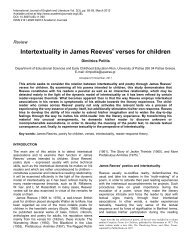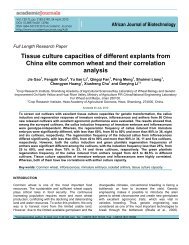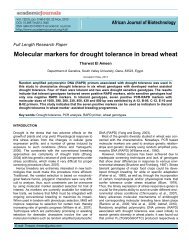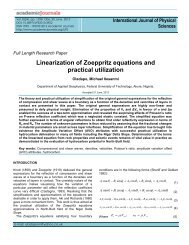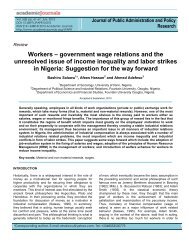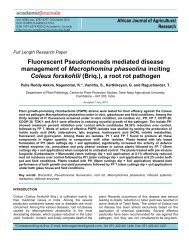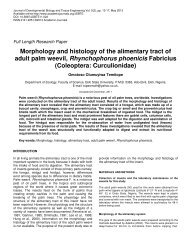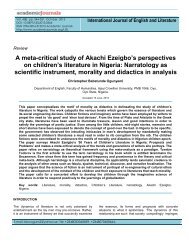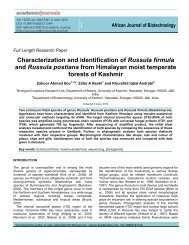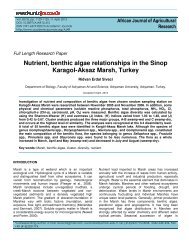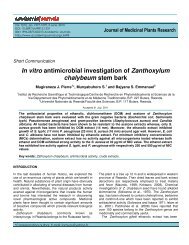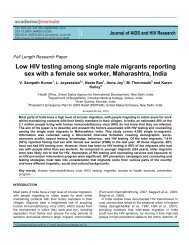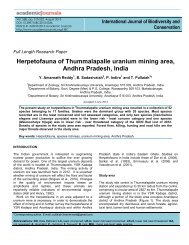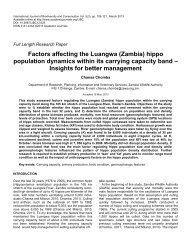Socio-economic impact potential of agro tourism activities on Desa ...
Socio-economic impact potential of agro tourism activities on Desa ...
Socio-economic impact potential of agro tourism activities on Desa ...
You also want an ePaper? Increase the reach of your titles
YUMPU automatically turns print PDFs into web optimized ePapers that Google loves.
Figure 1. Sustainable development model, (Granau<br />
and K<str<strong>on</strong>g>of</str<strong>on</strong>g>fman, 2008).<br />
Nelayan were solely from the fish catching <str<strong>on</strong>g>activities</str<strong>on</strong>g>, but<br />
after the emergence <str<strong>on</strong>g>of</str<strong>on</strong>g> the <str<strong>on</strong>g>agro</str<strong>on</strong>g><str<strong>on</strong>g>tourism</str<strong>on</strong>g>, they have the<br />
opportunity to run a number <str<strong>on</strong>g>of</str<strong>on</strong>g> <str<strong>on</strong>g>ec<strong>on</strong>omic</str<strong>on</strong>g> <str<strong>on</strong>g>activities</str<strong>on</strong>g> and<br />
this is not surprising as it has been proven by a number<br />
<str<strong>on</strong>g>of</str<strong>on</strong>g> previous studies (Gusti, 2007; Barlybaev et al., 2009;<br />
Holland et al., 2003). Based <strong>on</strong> his study, Gusti (2007),<br />
for example, c<strong>on</strong>cluded that generating related <str<strong>on</strong>g>tourism</str<strong>on</strong>g><br />
businesses are the most <str<strong>on</strong>g>potential</str<strong>on</strong>g> <str<strong>on</strong>g>agro</str<strong>on</strong>g><str<strong>on</strong>g>tourism</str<strong>on</strong>g><br />
development with businesses such as agricultural<br />
product sales, hand-made souvenirs or handicraft,<br />
opportunity to establish food stalls or restaurants and<br />
certain types <str<strong>on</strong>g>of</str<strong>on</strong>g> accommodati<strong>on</strong> such as homestay, villa,<br />
hotel and motel. Gusti (2007) furthermore stressed that<br />
agricultural products are the main products that are<br />
demanded by the tourists. According to Wils<strong>on</strong> et al.<br />
(2001), <str<strong>on</strong>g>agro</str<strong>on</strong>g><str<strong>on</strong>g>tourism</str<strong>on</strong>g> has an advantage which is less<br />
costly to develop and easier to establish as compared to<br />
other <str<strong>on</strong>g>ec<strong>on</strong>omic</str<strong>on</strong>g> development strategies. Results revealed<br />
by Lobo et al. (1999) supported what had been stressed<br />
by Gusti (2007), when they emphasized that <str<strong>on</strong>g>agro</str<strong>on</strong>g><str<strong>on</strong>g>tourism</str<strong>on</strong>g><br />
will have an <str<strong>on</strong>g>impact</str<strong>on</strong>g> <strong>on</strong> the demand for local products,<br />
intensify regi<strong>on</strong>al marketing efforts and widen the<br />
markets linkage and networking. This for sure will further<br />
boost the m<strong>on</strong>ey-making <str<strong>on</strong>g>activities</str<strong>on</strong>g> and generate pr<str<strong>on</strong>g>of</str<strong>on</strong>g>its<br />
for the community.<br />
Employment opportunities: One <str<strong>on</strong>g>of</str<strong>on</strong>g> the primary benefits<br />
brought by <str<strong>on</strong>g>agro</str<strong>on</strong>g><str<strong>on</strong>g>tourism</str<strong>on</strong>g> <str<strong>on</strong>g>activities</str<strong>on</strong>g> is bigger employment<br />
opportunities (Yang et al., 2010; Gusti, 2007; Akpinar et<br />
al., 2003). This opportunity is not <strong>on</strong>ly for the heads <str<strong>on</strong>g>of</str<strong>on</strong>g> the<br />
families but also for their wives and family members.<br />
Ec<strong>on</strong>omic <str<strong>on</strong>g>activities</str<strong>on</strong>g> brought by <str<strong>on</strong>g>agro</str<strong>on</strong>g><str<strong>on</strong>g>tourism</str<strong>on</strong>g> <str<strong>on</strong>g>activities</str<strong>on</strong>g><br />
have the capacity to generate a large scale <str<strong>on</strong>g>of</str<strong>on</strong>g><br />
employment opportunities for skilled and unskilled local<br />
communities. Hotels, chalets and motels for example will<br />
flourish and a lot <str<strong>on</strong>g>of</str<strong>on</strong>g> human resources power is needed to<br />
run such businesses. Furthermore, local communities<br />
have the opti<strong>on</strong>s to be empowered and be involved in<br />
self-employed <str<strong>on</strong>g>ec<strong>on</strong>omic</str<strong>on</strong>g> <str<strong>on</strong>g>activities</str<strong>on</strong>g> such as selling local<br />
products (sea products and handicrafts), c<strong>on</strong>ducting<br />
Hamzah et al. 4587<br />
seafood restaurants, homestay businesses and others.<br />
Poverty alleviati<strong>on</strong>: The intensificati<strong>on</strong> and<br />
diversificati<strong>on</strong> <str<strong>on</strong>g>of</str<strong>on</strong>g> <str<strong>on</strong>g>ec<strong>on</strong>omic</str<strong>on</strong>g> <str<strong>on</strong>g>activities</str<strong>on</strong>g> <str<strong>on</strong>g>of</str<strong>on</strong>g>fered by the<br />
<str<strong>on</strong>g>agro</str<strong>on</strong>g><str<strong>on</strong>g>tourism</str<strong>on</strong>g> activity can be an effective instrument to<br />
alleviate the poverty problems that might occur within the<br />
<strong>Desa</strong> Wawasan Nelayan community. According to<br />
Jamies<strong>on</strong> et al. (2004), <str<strong>on</strong>g>tourism</str<strong>on</strong>g> can be an effective<br />
instrument to fight poverty if these three requirements<br />
can be fulfilled:<br />
1. Ec<strong>on</strong>omic benefits gained through the <str<strong>on</strong>g>of</str<strong>on</strong>g>fers <str<strong>on</strong>g>of</str<strong>on</strong>g> full or<br />
part time employment or the development <str<strong>on</strong>g>of</str<strong>on</strong>g> SME<br />
opportunities produced by the intensificati<strong>on</strong> and<br />
diversificati<strong>on</strong> <str<strong>on</strong>g>of</str<strong>on</strong>g> <str<strong>on</strong>g>ec<strong>on</strong>omic</str<strong>on</strong>g> <str<strong>on</strong>g>activities</str<strong>on</strong>g> brought by<br />
<str<strong>on</strong>g>agro</str<strong>on</strong>g><str<strong>on</strong>g>tourism</str<strong>on</strong>g> <str<strong>on</strong>g>activities</str<strong>on</strong>g>.<br />
2. Other livelihood benefits such as access to potable<br />
water, roads which bring benefits to poor producers<br />
through, for example, improved access to markets,<br />
improved health and educati<strong>on</strong> and other benefits.<br />
3. Opportunities and capacity for engagement in<br />
decisi<strong>on</strong>-making to make the poor able to improve their<br />
livelihood by securing better access to tourist and <str<strong>on</strong>g>tourism</str<strong>on</strong>g><br />
enterprise.<br />
Sustainable development<br />
According to Granau and K<str<strong>on</strong>g>of</str<strong>on</strong>g>fman (2008) and Manzilu<br />
and Iancu (2006), <str<strong>on</strong>g>tourism</str<strong>on</strong>g> <str<strong>on</strong>g>activities</str<strong>on</strong>g> (which include<br />
<str<strong>on</strong>g>agro</str<strong>on</strong>g><str<strong>on</strong>g>tourism</str<strong>on</strong>g>) can assist in achieving community<br />
sustainable development. Granau and K<str<strong>on</strong>g>of</str<strong>on</strong>g>fman (2008),<br />
drew this c<strong>on</strong>clusi<strong>on</strong> based <strong>on</strong> the justificati<strong>on</strong> that in<br />
terms <str<strong>on</strong>g>of</str<strong>on</strong>g> <str<strong>on</strong>g>ec<strong>on</strong>omic</str<strong>on</strong>g> sustainability, <str<strong>on</strong>g>agro</str<strong>on</strong>g><str<strong>on</strong>g>tourism</str<strong>on</strong>g> can act as<br />
an additi<strong>on</strong>al source <str<strong>on</strong>g>of</str<strong>on</strong>g> income which will boost the<br />
community purchasing power. Thus this will support<br />
sustainable development. Granau and K<str<strong>on</strong>g>of</str<strong>on</strong>g>fman (2008)<br />
furthermore justified that in terms <str<strong>on</strong>g>of</str<strong>on</strong>g> social development,<br />
(Figure 1). Agro<str<strong>on</strong>g>tourism</str<strong>on</strong>g> <str<strong>on</strong>g>activities</str<strong>on</strong>g> can be a tool for the<br />
preservati<strong>on</strong> <str<strong>on</strong>g>of</str<strong>on</strong>g> cultural identity, to further develop the<br />
local societies and to <str<strong>on</strong>g>of</str<strong>on</strong>g>fer a fair allocati<strong>on</strong> <str<strong>on</strong>g>of</str<strong>on</strong>g> resources.<br />
C<strong>on</strong>versely, Granau and K<str<strong>on</strong>g>of</str<strong>on</strong>g>fman (2008) also stressed<br />
that <str<strong>on</strong>g>agro</str<strong>on</strong>g><str<strong>on</strong>g>tourism</str<strong>on</strong>g> doubtlessly will develop people‟s<br />
positive attitude towards envir<strong>on</strong>ment preservati<strong>on</strong>.<br />
Envir<strong>on</strong>ment sustainability: Envir<strong>on</strong>ment sustainability<br />
is indeed an important issue to be emphasized within the<br />
<str<strong>on</strong>g>agro</str<strong>on</strong>g><str<strong>on</strong>g>tourism</str<strong>on</strong>g> <str<strong>on</strong>g>activities</str<strong>on</strong>g> <str<strong>on</strong>g>of</str<strong>on</strong>g> <strong>Desa</strong> Wawasan Nelayan as it is<br />
hugely linked to the social and <str<strong>on</strong>g>ec<strong>on</strong>omic</str<strong>on</strong>g> issues as most<br />
<str<strong>on</strong>g>of</str<strong>on</strong>g> the <strong>Desa</strong> Wawasan Nelayan communities are<br />
dependent <strong>on</strong> natural resources. The dependency can be<br />
a success if the envir<strong>on</strong>ment is well managed by the<br />
community and by the resp<strong>on</strong>sible agencies (Keskinen<br />
and Varis, 2005).<br />
C<strong>on</strong>versely, <str<strong>on</strong>g>agro</str<strong>on</strong>g><str<strong>on</strong>g>tourism</str<strong>on</strong>g> will encourage the authorities<br />
and the community to preserve the envir<strong>on</strong>ment more<br />
than before and will create envir<strong>on</strong>mental awareness<br />
am<strong>on</strong>g the community (Anthopolou, 2000). Besides,



